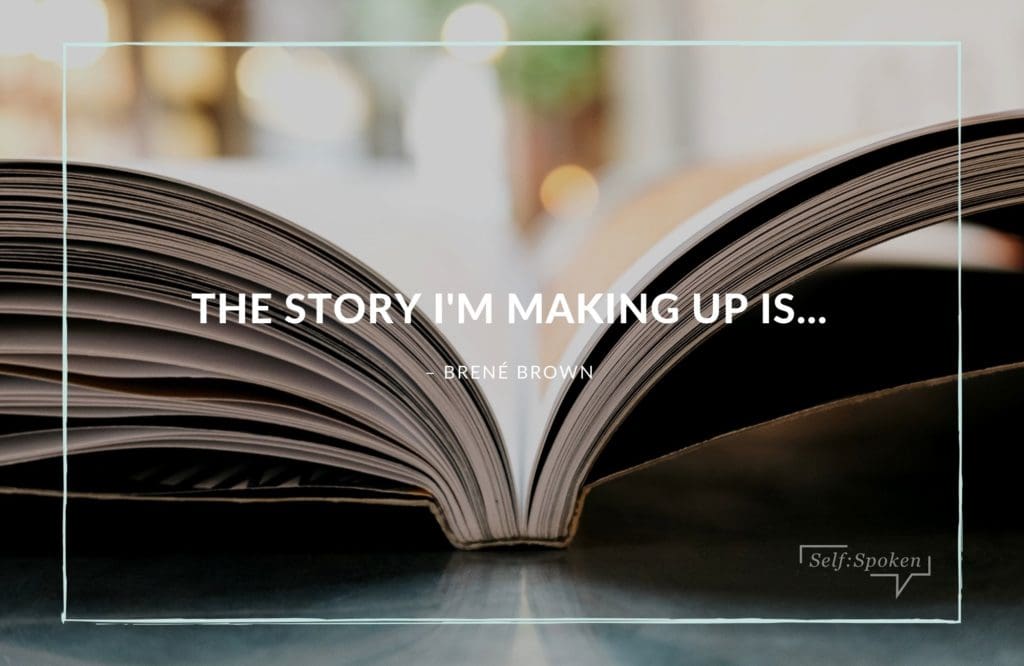Do three dots appearing in your text exchange, followed by an abrupt disappearance of those three dots ever become: “She doesn’t like what I suggested, I knew I shouldn’t have tried to make plans with her.”
Does an email with the subject line: “Time for a call?” ever become: “Oh great, what did I screw up this time?”
Does a colleague’s skeptical expression during a meeting you’re leading ever become: “What an A-hole, it’s like he’s trying to get under my skin!”
If so, welcome to the human family.
It’s 100% certified NORMAL to try and decipher other people’s cryptic behavior. And it’s even more normal to conclude that their behavior has something to do with their opinion of you, specifically.
The good news is, Brené Brown’s brilliant tool: ‘the story I’m making up…’ is extraordinarily helpful in moments like these…

Just by saying it to yourself first, it can help you:
✓ Clarify what triggered you
✓ Honor and name what you’re feeling—without making assumptions or blaming others.
✓ Voice your concerns in an authentic, straight-forward way.
✓ Give others the chance to clarify their behavior– without accusing them or putting them on the spot.
And before I show you how it works, here’s why it works:
When something frustrating happens to you, your brain begs for one thing above all else: a story.
And if you give your brain a story, it rewards you chemically with a chemical called dopamine, which makes you feel more in control and at ease.
And here’s the kicker: your brain will release that dopamine, even if the story you gave it isn’t entirely accurate! That’s right, as long as the brain recognizes that you’ve pieced together A story, it’ll reward you regardless of how accurate that story is.
And as Brené so wisely points out:
“What do we call a story that’s based on limited real data and imagined data and blended into a coherent, emotionally satisfying version of reality? A conspiracy theory.”
So my friend, here’s the uncomfortable truth of the matter: you and I walk around all day coming up with conspiracy theories about people who rub us the wrong way!
The worst part? More often than not we act on these theories we’ve made up about other people without reality-checking those theories first. We get heated, we react, or we just let the frustration fester.
If you want to get better at addressing questionable behavior head-on, so you don’t have to sit and stew in your brain’s painful conspiracy theories…
It’s time to get better at owning the stories you’re making up!
Here’s how:
Next time someone does something that triggers or confuses you – and you sense that self-talk bubbling up on the inside…
STEP 1: Ask yourself: What’s the story I’m making up in reaction to this? Brené calls this our “sh*tty first draft”
→ Pro Tip: Helps to write it out! ![]() Make sure to include your emotions, thoughts, bodily sensations, beliefs & desired actions.
Make sure to include your emotions, thoughts, bodily sensations, beliefs & desired actions.
Steps 2 & 3: SO!? – Separate the facts & Own your part
→ Separate: What are the facts and what are your theories? Separate them out.
→ Own: What part did you play? What can you take responsibility for? What can’t you own? What info do you need from the other person(s)?
Step 4: Write out the next draft by owning what’s yours, articulating your made-up stories, and asking for clarity.
As Brené so perfectly put it:
“Facing our stories takes courage. But owning our stories is the only way we get to write a brave new ending.”
Your giant heart is your biggest asset. The fact that you’re sensitive and care what others think about you is not wrong or silly, it’s what makes you the unbelievably thoughtful and empathetic gem that you are!
We just gotta make sure you know how to dive under those big feelings of yours, so you can separate what’s truly causing your struggle from the quick, messy story your brain wants to make up to protect you. And ultimately we want you to be able to articulate those struggles to others in most meaningful, productive way possible.
You got this ![]()
All my love,


How to Be More Direct (And Stop Abandoning Yourself)
On a recent coaching call, someone raised the question of how to be more direct in your communication without making others uncomfortable… The truth?…
Before we jump into today’s blog post, make sure to download the FREE companion worksheet, 2022: Reflect & Reset. It’ll take you through each…
Have you ever wanted to improve your communication skills and day-to-day speaking confidence, but the advice you found online or in self-help books just……



